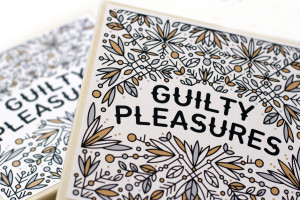On Guilty Pleasures
Let’s do a thought experiment. If I say, “guilty pleasure TV,” what shows come to mind? My guess: reality shows like “America’s Next Top Model” or “The Bachelor.” What about films? Probably anything IMDb labels a “chick flick.” Books? “Chick lit.” And has anyone gone to a boy band concert lately?
I’m sensing a pattern here. Content produced by and/or for women is suspect.
For the historical view, Jane Austen is a familiar place to start. Yes, I mean the Jane Austen you read in your AP English class, the one whose books have prominent positions on Barnes & Noble’s “Classics” shelves. Jane Austen, novelist at a time when the novel was a literary genre dominated by women—and therefore devalued (sorry, biology majors).
“Although our productions have afforded more extensive and unaffected pleasure than any other literary corporation in this world, no species of composition has been so much decried. … There seems almost a general wish of decrying the capacity and under-valuing the labour of the novelist, and of slighting the performances which have only genius, wit, and taste to recommend them.” [x]
Jane Austen wrote the trashy romance novels of the early nineteenth century, and she knew it, and she understood how unfair it was that her work—and, as a consequence, those who found pleasure in it—was trivialized.
For a contemporary perspective, we can turn to Kristan Higgins, who writes of modern romance novels, “The categorical dismissal of the most-read genre in the world reveals ignorance, not intellectual superiority. This is a billion-dollar industry, and it’s not built on vapidity and cliché.”
As I see it, here is what generally happens. A lot of well paid, mostly white, mostly male executives work to produce and market something for (at) young women. Young women then like this thing, like this thing so much that they take bits of it and make it their own, or simply like it so very openly that white male cultural commentators bemoan female hysteria (did we never leave the nineteenth century?) and whine about how vapid we all are. Even though we are consuming and loving The Thing that was created for us to consume and love; even though they are making money off of our engagement with The Thing.
To recap: the media understood to be ‘guilty pleasure’ content tends to be specifically marketed at women, who are then belittled for their consumption of it. Young women’s enthusiasm is something akin to a reverse Midas touch: whatever we claim becomes tainted—even though we might, more or less literally, be handing gold to the men who hold the copyright.
Men, on the other hand, are allowed to love things. We might roll our eyes a bit at Dad’s obsession with NASCAR or an uncle’s passion for the NFL, but we don’t tend to automatically assume men who enjoy these things are less intelligent and less worthy of our respect. Following a sport or two is acceptable, normal. This is rather amusing when one considers that, in the hands of male fans, sports have become the definition of guilty pleasures—can we talk about the damage done by post-game riots?
I’m tempted, here, to tell you that I don’t read romance novels, to note that I’ve never even been in the bodice-ripper section of a bookstore or library, to distance myself from this subject and impress you with my intellectual bona fides. But while that specific example might be true, I do consume a large amount of guilty pleasure media, and I’m mostly interested in my knee-jerk impulse to make a shield out of every word of Dostoyevsky and Nabokov and Flaubert that I’ve ever read. (See what I did there?)
The concept of ‘guilty pleasures’ is gendered and misogynistic, and I’m tired of playing defense. Being generally clever or thoughtful or equally passionate about High Culture Things shouldn’t be the get-out-of-jail-free card that ‘permits’ us to be enthusiastic about our ‘guilty pleasures.’ I’m tired of using a bargaining system to distance myself from things I love, this system of, “I am capable of speaking intelligently about Important Things and therefore you should take me seriously as a person even after I’m fangirled in front of you.” I’m tired of people praising me when I an express an interest in something that isn’t thought of as a ‘guilty pleasure,’ because ‘I’m not like other girls’ is another sentiment I’d like to eliminate from the way in which I engage with the world.
This is not to say that I never have any problems with my ‘guilty pleasure’ consumption. This is not to say that I don’t identify with Roxane Gay’s conception of ‘bad feminist.’ As author Daniel José Older wrote in an April 2014 Buzzfeed article, “We can love a thing and still critique it. In fact, that’s the only way to really love a thing,” which is perhaps a little bit like saying we can have our cake and eat it, too.
It would be my pleasure.

![[in]Visible Magazine](https://community.scrippscollege.edu/invisible/wp-content/uploads/sites/5/2011/04/Invisible-Masthead-2011-Spring1.png)








Comments are closed.